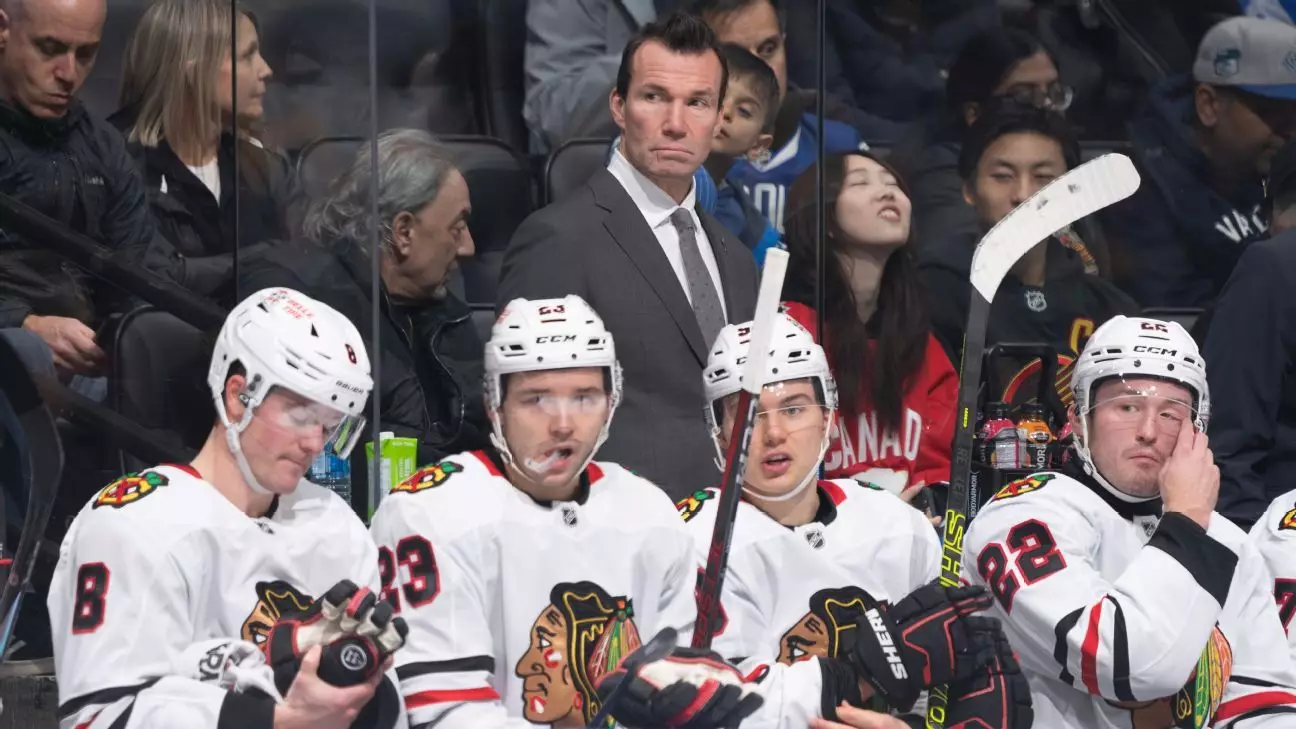In a move that surprised few but disappointed many, the Chicago Blackhawks made the decision to part ways with head coach Luke Richardson after a tumultuous three-year tenure. His record, a dismal 57 wins, 118 losses, and 15 overtime losses, reflects the struggles the team faced during a prolonged rebuilding phase. With the Blackhawks currently languishing at the bottom of the NHL standings, this change is seen as a necessary step in an effort to revitalize a once-proud franchise desperate for relevance.
Richardson, who was in the final year of his contract, had apparently failed to align his performance with the expectations set forth by the organization. After a challenging start to the 2024 season, with the Blackhawks holding an 8-16-2 record after 26 games—a record that places them firmly in the cellar of the league—it became evident that a shift in leadership was necessary. General Manager Kyle Davidson’s statement underlines a broader ambition: “As we have begun to take steps forward in our rebuilding process, we felt that the results did not match our expectations.” This sentiment speaks to both a recognition of the team’s potential and the need for accountability.
Taking over the reins is Anders Sorensen, the head coach for the AHL Rockford IceHogs, who has earned high praise for his coaching capabilities. Known for being a “great communicator and teacher,” his ascension to the interim head coach position signals a fresh approach that combines experience with a deep understanding of the Blackhawks’ developmental strategies. Davidson has expressed confidence in Sorensen, suggesting that if he executes well for the remainder of the season, he may be in line for the full-time head coaching position moving forward.
This choice exemplifies a growing trend within the organization to emphasize a unified vision among coaching staff and player development. Sorensen’s achievements in the AHL, where he has guided teams to playoff appearances in each of his three seasons, indicate that he possesses the strategic acumen and interpersonal skills necessary to inspire and guide players at the NHL level.
One of the most glaring issues under Richardson was the underperformance of key players. Connor Bedard, the much-lauded rookie who was supposed to be the cornerstone of the Blackhawks’ future, found himself struggling with only five goals in 26 games, an underwhelming return given the high expectations. His frustration resonated when he articulated the feelings shared by many in the locker room, emphasizing that merely playing competitively without securing wins was not an acceptable standard: “We’re not just going to be happy that we stayed in a game… Losing is not fun,” he poignantly remarked.
Criticism aimed at Richardson also stemmed from his strategic decisions, particularly the frequent reshuffling of line combinations and the misutilization of talent. Bedard’s transition from the center position—a role where he excels—to the wing has raised eyebrows, as did Richardson’s attempt to infuse a stronger defensive focus into the play style amidst offensive struggles. Such decisions can undermine player confidence, particularly during a rebuild when nurturing young talent is paramount.
As the Blackhawks embark on this new chapter, many eyes will be focused on the developmental pipeline in Rockford. With young, promising talents like Frank Nazar, Kevin Korchinski, and Artem Levshyunov in the AHL, the organization is at a critical juncture. Sorensen’s relationship with these players could be pivotal in making intelligent decisions about their eventual call-ups to the NHL. Nazar, standing out as a top scorer in the AHL this season, embodies the kind of talent that could revitalize the struggling NHL club if properly integrated into the roster.
Blackhawks chairman Danny Wirtz’s backing of Davidson’s decision indicates a desire for greater alignment between the management team and the coaching staff. If Sorensen can establish rapport with the key young players and foster an environment that encourages growth, the Blackhawks might just begin to turn their fortunes around.
The uncertainty surrounding their next permanent head coach might loom over the season. Yet, the confidence in the direction is palpable. Change is often challenging, but it can also signal the dawn of a new era—one rooted in hope and potential for a franchise that has experienced both triumph and trials in its storied history. As they move forward, the Blackhawks will certainly be navigating a winding path, but it appears that management is committed to seeing the effort through to fruition. The real question is whether this new leadership can cultivate a winning culture and return the Blackhawks to hockey prominence.

